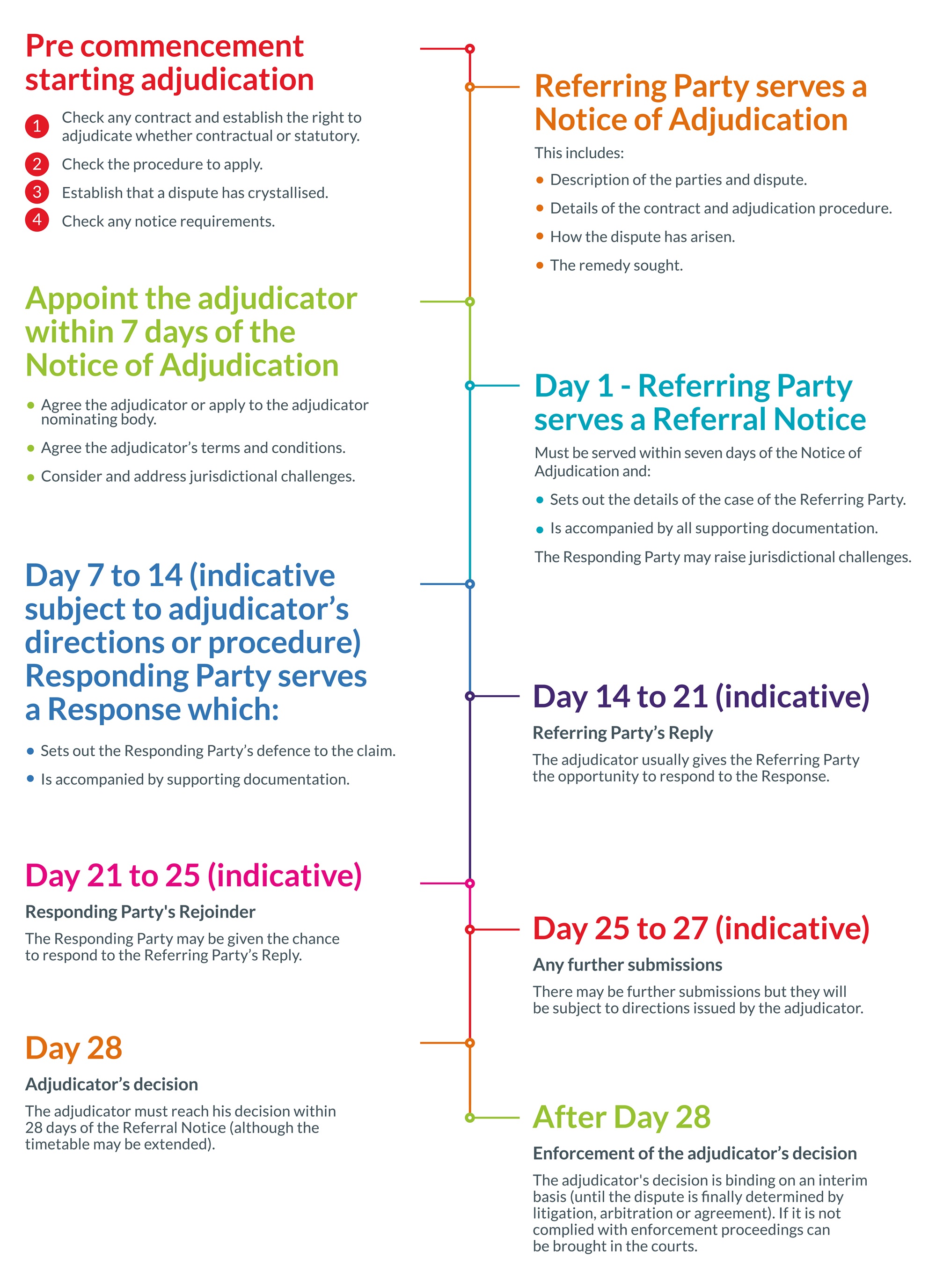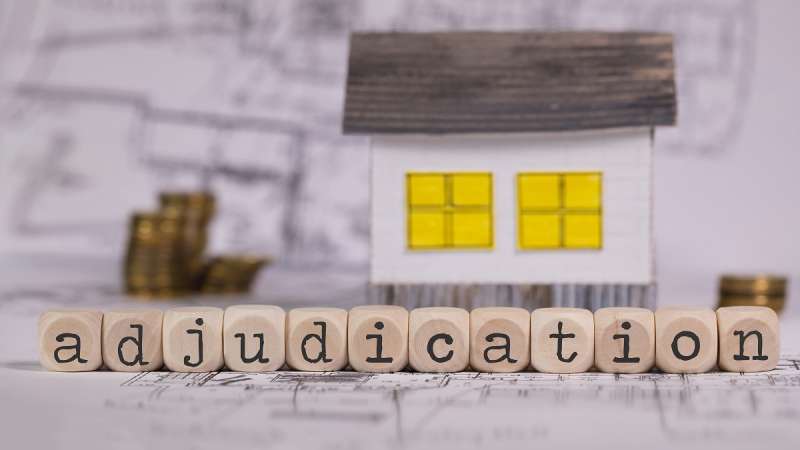Our Construction Adjudication Service
Construction adjudication is a form of Alternate Dispute Resolution which is specific to construction disputes.
The purpose behind adjudication is to resolve disputes quickly and provide a cash-flow remedy, while keeping intact working relationships, in order that construction projects can continue without delay, fallout or great cost.
Any party to a construction contract has a statutory right, under the Construction Act, to refer a dispute to adjudication at any time. Construction adjudication is often described as “pay first, argue later” as it is a mechanism for resolving disputes on an interim basis.
The adjudicators' decision is binding until the dispute is fully determined by legal proceedings, arbitration or agreement.
Adjudication typically takes 28 days from the date the dispute is referred to adjudication. It is, therefore, a powerful tool for resolving disputes quickly and it keeps construction projects on track without the need for costly and protracted court proceedings.

Construction adjudication is typically used for claims relating to:
- Interim payments
- Delay and disruption of the works
- Extensions of time for completion of the works
- Defects in the works
- The final account
- Breach of contract
- Termination of a contract
- Professional negligence
Although, the framework of adjudication was not designed to resolve complex construction disputes the extent to which these are dealt with via adjudication appears to be increasing.
Myerson’s construction team understand that adjudication can be an efficient means of resolving a dispute whilst also recognising the potential pitfalls and issues that parties to this particular mechanism can face.
Myerson’s specialist construction team can help you realise the best possible outcome with a strategy that is tailored to your commercial circumstances.
Why Work With Our Construction Lawyers?
- We have been ranked as a Top Tier law firm by the Legal 500 for the last seven years.
- You will have access to construction experts in the Myerson Construction Group.
- You will receive city-quality construction legal advice at regional prices.
- Our construction lawyers provide a partner-led service to ensure you receive the best legal advice and commercially minded support.
- Our construction solicitors have a large team of qualified solicitors which can meet your deadlines.
- Our construction dispute solicitiors understand that each matter is bespoke to your unique circumstances and that you need support from a construction lawyer experienced in dealing with various clients and types of work.
- We are a full-service law firm operating from a one-site office, which means our teams communicate effectively and efficiently.
- Our construction team use the latest technology to ensure that they are working as efficiently as possible, and that geographical distance will not prevent us from providing excellent client service.
- Look at the Myerson Promise for further benefits of working with us here.
Construction Adjudication Timeline

Our Approach to Construction Disputes
Whether you are a developer, contractor or sub-contractor, we are specialist construction lawyers who understand your business. We will bring our knowledge to develop ideas, manage risks and create commercially driven solutions.
As a client, your agenda will be a primary focus for us: what is important to you, the challenges, the opportunities, and how we can deliver what you need.
Our construction lawyers pride themselves on providing clear, commercial and pragmatic advice to clients through detailed technical knowledge, expertise and enthusiasm. Some of our lawyers have a background in engineering and, with industry experience, we can speak your language.
You will be fully confident that your legal advisors have the resources, skills and knowledge to manage the risks and deliver the service you need on time and budget.
Our construction lawyers can provide pragmatic and commercial advice on what is worth fighting for.
Our construction solicitors can get into the detail but also keep sight of the bigger picture. We can deliver without taking needless points. We always ensure our legal advice works as part of an overall solution that helps clients achieve their goals.
Construction Adjudication Case Studies
- We have acted on a number of significant transactions and disputes including successfully acting for the insolvent claimant in the reported case of Styles & Wood Ltd v GE CIF Trustees Ltd involving a final account adjudication and enforcement proceedings which was the first successful action of its kind following the Supreme Court decision in Bresco Electrical Services Ltd (in liquidation) v Michael J Lonsdale (Electrical) Ltd. We have written a separate detailed case study on this which can be viewed here.
- We successfully acted for a contractor on the defence of a high value ‘smash and grab’ adjudication against a sub-contractor to a tight timescale with extensive written submissions being required.
- We regularly advise clients on payment issues at all levels of the supply chain including defending and pursuing claims in adjudication proceedings.
Construction Adjudication FAQs
This is a back to basics guide to construction adjudication. It is intended to help those new to adjudication to understand the basic process and it details its advantages and disadvantages.
What is the next step after adjudication?
After the adjudication process concludes, parties typically must comply with the adjudicator's decision.
This often involves one party making a payment or taking a specific action.
If a party is dissatisfied with the decision, they can seek to have the dispute resolved through litigation, arbitration, or another agreed-upon dispute resolution mechanism, but they must usually comply with the adjudication outcome in the interim.
It's also crucial to review the terms of the contract and any governing laws to ensure all subsequent steps align with legal and contractual obligations.
What is construction adjudication?
Construction adjudication is a dispute resolution process specifically designed for the construction industry.
Introduced in several jurisdictions to address the often complex and frequent disputes in construction projects, adjudication offers a swift and cost-effective means of reaching a decision.
Any party to a construction contract has a statutory right, under the Housing Grants, Construction and Regeneration Act 1996 as amended (“the Construction Act”) to refer a dispute to adjudication at any time, provided the contract is a ‘construction contract’ as defined in the Construction Act.
Adjudication is often described as “pay first, argue later” as it can be a mechanism for resolving disputes on an interim basis.
What does construction adjudication cost?
The expenses associated with construction adjudication will vary based on the specifics and intricacy of each dispute.
It's important to consider that:
- The party initiating the adjudication is responsible for covering the fee of the body that nominates the adjudicator.
- Typically, each party shoulders its own legal fees, which cannot be claimed back.
- The adjudicator's fees are often addressed within the adjudication decision. While these fees generally fall on the losing party, both parties are typically jointly responsible for ensuring the adjudicator's costs are paid.
How long does construction adjudication take?
Typically, the construction adjudication process takes 28 days from the referral of the dispute to the adjudicator to the delivery of their decision.
This 28-day period is a standard in many jurisdictions, such as the UK under the Housing Grants, Construction and Regeneration Act 1996.
Construction adjudication is designed to be a swift method of dispute resolution.
What is the adjudication process?
Adjudication is a dispute resolution process used primarily in the construction industry.
Here's a step-by-step breakdown of the typical adjudication process:
1. Notice of Adjudication: The party initiating the adjudication (the "referring party") serves a Notice of Adjudication on the other party. This notice outlines the nature of the dispute and the redress being sought.
2. Appointment of Adjudicator: The parties can agree on an adjudicator. If they can't agree, an adjudicator is appointed by a nominating body identified in the construction contract or, if not specified, by a recognised external body.
3. Referral Notice: After the adjudicator is appointed, the referring party has a set period (often seven days) to serve the Referral Notice. This document provides a detailed account of the dispute, including any supporting documents.
4. Response: The other party (the "responding party") then has a chance to provide its response to the Referral Notice, stating its case and presenting any counterclaims or defences.
5. Adjudicator's Review: The adjudicator reviews all submitted documents, evidence, and arguments. They may also seek further clarifications, ask for additional documents, or even organise a site visit if necessary.
6. Decision: The adjudicator provides a decision, typically within 28 days from receiving the Referral Notice, though this can be extended if both parties agree or if the adjudicator deems it necessary due to the complexity of the dispute.
7. Enforcement: The adjudicator's decision is binding on an interim basis. Both parties must adhere to it unless they mutually decide to overturn it or if it's subsequently changed through arbitration or litigation. If a party doesn't comply with the adjudicator's decision, the other party may need to take legal action to enforce it.
8. Payment of Costs: The costs associated with the adjudication (like the adjudicator's fees) are typically addressed in the adjudicator's decision. Often, the losing party bears these costs, though the exact distribution can vary based on the circumstances and the terms of the contract.
It's worth noting that while the process is structured, it offers a degree of flexibility. The parties can agree on variations to timelines or even the procedure, as long as they remain within the framework established by the relevant legislation or contractual terms.
When is adjudication used?
Adjudication is typically used for claims relating to:
- Interim payments
- Delay and disruption of the works
- Extensions of time for completion of the works
- Defects in the works
- The final account
- Breach of contract
- Termination of a building contract
- Professional negligence
Although the framework of adjudication lends itself to less complex construction disputes, e.g. for payment disputes rather than professional negligence, there is an increasing reliance on the process due to its expediency in deciding disputes at a fraction of the cost of proceedings in the courts.
Is adjudication legally binding?
The decision from adjudication is legally binding and can be swiftly enforced through a streamlined court process.
However, this decision can be altered by subsequent legal actions, arbitration, or mutual agreement.
Frequently, contracts stipulate that the decision becomes final if no formal challenge is initiated within a designated timeframe.
What are the advantages of adjudication?
Adjudication offers several advantages, especially when compared to more traditional methods of dispute resolution like court proceedings or arbitration.
Here are some of the primary benefits:
- Speed of Decision: Adjudication delivers decisions much faster than courts or arbitration, typically within 28 days from the service of the referral notice. This prompt resolution can help parties move forward without prolonged uncertainty.
- Efficiency: Court proceedings or arbitration can be considerably longer and more time-consuming than adjudication. This means parties can get back to their primary activities sooner, reducing the impact of the dispute on their operations.
- Cost-Efficiency: The swiftness of the adjudication process can lead to significant reductions in legal costs. The shorter timeframe usually translates to fewer billable hours and other associated expenses.
- Favourable to Smaller Firms: Smaller construction firms, often operating with limited resources, tend to favour adjudication as a more practical and less financially burdensome alternative to court or arbitration.
- Flexibility in Process: Adjudication might not always require a physical meeting or hearing. In many cases, the process can be entirely document-based, making it more adaptable and less disruptive.
- Cost Bearing: Parties generally bear their own costs in adjudication. This approach eliminates the risk of one party having to shoulder the opposing party's expenses, which can be a significant financial relief.
- Scope of Application: Initially designed to aid cash flow in construction projects, adjudication has evolved to address a broader range of disputes, making it a versatile tool for various disagreements.
- Enforcement and Reliability: There are limited grounds on which courts can refuse to enforce an adjudicator’s decision. This provides parties with confidence in the adjudication process, knowing that outcomes are usually upheld.
- Provision for Further Resolution: While the decision of an adjudicator is enforceable, it's not necessarily the final word on the matter. If parties are dissatisfied, issues can be revisited through litigation, arbitration, or mutual agreement, offering an avenue for more in-depth exploration if needed.
In essence, adjudication offers a balance between efficiency and fairness, providing a swift yet comprehensive method for resolving disputes.
What are the disadvantages of adjudication?
Adjudication, while beneficial in certain situations, also has its drawbacks.
Some of the disadvantages include:
- Rapid Decision-making: The speed of the process might lead to a situation where there isn't sufficient time to thoroughly evaluate and examine all the facts and issues pertaining to the claim. Consequently, the decision can be inherently 'rough and ready' and may not capture all nuances of the dispute.
- Intensive Nature: The process can be rigorous, demanding quick responses within short time frames. This means parties involved need to allocate adequate time and resources for the process, often on short notice.
- Non-recovery of Legal Costs: Unless there's a post-adjudication notice written agreement, parties cannot recover the legal costs they've incurred during adjudication. This can make it a costly affair, especially for parties that have invested heavily in legal resources.
- Cost Implications for Complex Disputes: In disputes of high complexity, the adjudication process can be expensive. This is due to the intensive preparation required to comply with the tight deadlines, which can strain the financial and human resources of the involved parties.
- Lack of Formal Hearing: If a meeting or hearing isn't mandated, parties might feel deprived of their 'day in court'. This means they miss out on the chance to present their case in detail and to cross-examine witnesses, potentially leaving some issues unresolved or unaddressed.
- Limited Grounds for Non-enforcement: There are only a few grounds on which courts might refuse to enforce an adjudicator’s decision. This can sometimes lead to outcomes that are perceived as unfair, especially if the adjudicator's decision seems not to reflect the full depth of the dispute.
- Interim Nature: While the adjudicator’s decision is binding, it's often only on an interim basis until the dispute is finally determined by court, arbitration, or agreement. This means the process might merely be a temporary solution rather than a final resolution.
- Potential for Fragmentation: If a dispute comprises several related issues, adjudication might address only one or a subset of these issues. This can lead to fragmented decision-making, where different aspects of the same overarching dispute are decided separately.
In conclusion, while adjudication offers a swift and practical approach to resolving disputes, especially in industries like construction, it's essential for parties to be aware of its limitations and potential pitfalls.
Should I refer a dispute to adjudication?
Whether or not you should refer a dispute to adjudication depends on various factors, including the nature of the dispute, the urgency for resolution, potential costs, and your ultimate objectives.
The main aim of adjudication was to keep cash flowing and projects on track. It was designed to be limited to single disputes and to deal swiftly with discrete issues to avoid them developing into disruptive, expensive matters.
Payment disputes during the contract are ideally suited to adjudication but it can also be used to deal with more complex disputes. Adjudication is a powerful tool for resolving disputes quickly and it keeps construction projects on track without the need for costly and protracted court proceedings.
However, it pays to weigh up the complexity of the dispute and consider whether adjudication is, in fact, the best remedy particularly since costs are unlikely to be recoverable.
It is always worth looking at alternative methods of dispute resolution, such as mediation, expert determination or even by starting the pre-action protocol procedure prior to commencing legal proceedings.
If a quick decision is preferred in order to keep a project on track or to secure payment, adjudication should be high on the agenda, even if the decision may be a little ‘rough and ready’.
Myerson’s construction team understand that adjudication can be an efficient means of resolving a dispute, whilst also recognising the potential pitfalls and issues that parties to this process can face.
Our specialist construction team can help you realise the best possible outcome with a strategy that is tailored to your commercial circumstances.
Meet Our Specialists
Home-grown or recruited from national, regional or City firms. Our specialists are experts in their fields and respected by their peers.
Contact Our Experts
You can contact our lawyers below if you have any more questions or want more information:








